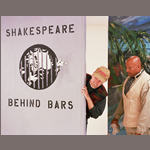Shakespeare Behind Bars (Hank Rogerson)
“As you from crimes would pardoned be. Let your indulgence set me free.”
This line within the epilogue of William Shakespeare’s play, The Tempest, rings a loud chord and represents the essence of this documentary, set within the walls of Kentucky’s Luther Luckett Correctional Complex.
Shakespeare Behind Bars is an annual production that has taken place for over seven years, where convicted felons within this prison work with volunteer director Curt Tofteland, learning, rehearsing, and choosing their own roles to play that best fit their own personal views of who they are and what they’ve done. This time the play was The Tempest, which was one of the last plays written by Shakespeare and one the director felt best expressed the final journeys some of these inmates were taking as they prepared for parole.
This film not only provides an honest look at life behind bars, but at the men who, through the performance of this play, identify with its characters and discover a deeper sense of why they committed the crimes that led to their incarceration. It was painful to see each man expressing their history and patterns of child abuse and neglect by fathers and mothers, which eventually led to their violent crimes.
The cast is made up of what the director Tofteland called “the dregs of society,” but he also felt if the playwright had known these men back then, they could have easily made it on to Shakespeare’s Global stage. The film replaces the prisoner number with a person, as each man face his fear, pulling off the emotional, protective mask in order to really excel at his craft. The lines are cathartic, providing a tale of discovery, of forgiveness of self and of others, and of letting go. Through this process, many of them expressed the deep desire for redemption, and to be given a chance to bring balance within the totality of their lives by someday being given another chance to contribute to society.
Shakespeare Behind Bars is insightful and even spiritual. The lead character, Prospero, has a line towards the end of the play that surmises how the rarer action is in virtue rather than in vengeance, which is the opposite of his original plan for revenge that began the play. And as the film shows many times, the ones who need mercy most are the ones who deserve it the least, but without forgiveness how can healing and evolution ever take place?
It has often been said by literary greats such as Ben Johnson at the time of Shakespeare’s death, by Al Pacino in his documentary Finding Richard about breaking down the play Richard the III, and by the director of these plays: that Shakespeare’s writings were timeless. His insights into human behavior that inspired 37 plays and numerous sonnets are as true and relevant today as they were 400 years ago. Thankfully, his words are still being used today to educate and even help heal, and thankfully, director Hank Rogerson has presented one of the many ways this is happening within a population that society would like to forget.

